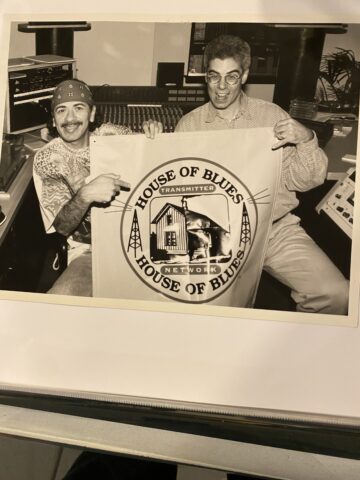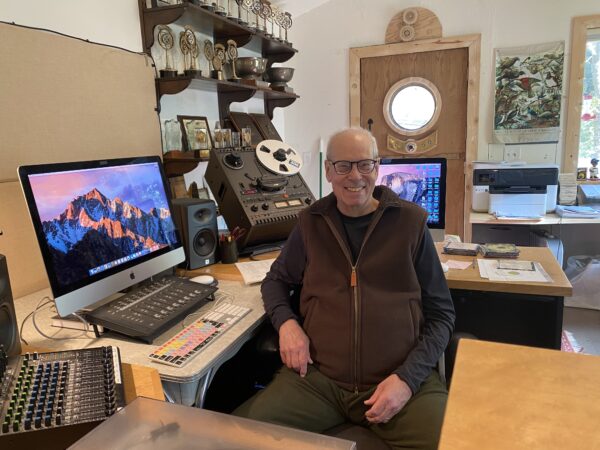
Carlos Santana and Ben Manilla in studio recording a House of Blues Radio Hour interview. Photo courtesy of Ben Manilla.
The Library of Congress will celebrate the work of longtime Berkeley Journalism lecturer Ben Manilla — who produced the award-winning House of Blues Radio Hour with comedian and musician Dan Aykroyd for 25 years — at a public event with surprise musical guests in Washington DC on June 27.
Manilla interviewed hundreds of legendary blues musicians for the House of Blues Radio Hour, which was hosted by Aykroyd in the persona of Elwood Blues, from the famed Blues Brothers revue band he formed with the late comedian John Belushi in 1978.
At Manilla’s initiation and with help from his early fundraising, the Library of Congress will preserve all episodes of the radio show along with 2,000 raw, unedited interviews with blues musicians, some of whom are now deceased. The digitized files will be accessible to anyone through the Library of Congress.
“I feel like it’s a contribution to the history of American music and the history of American culture,” said Manilla, who taught radio classes at the school for a decade. “There are no other forms of music that are strictly American, but you can say that about the blues. It grew out of the Black experience. Black church. Black workers. It became rock and roll and jazz and rhythm and blues. These are the roots.”
Manilla started out in radio as a disc jockey in New York in the 1980s and while he loved it, he knew he wouldn’t make it big in that scene with the rise of new “Shock Jocks” like Howard Stern. Instead he became a go-to editor in New York who produced stories for the likes of NPR and the BBC.
After moving to San Francisco in the early 1990s, Manilla directed the live national broadcast of the “Rock and Roll Hall of Fame” induction of John Lee Hooker, hosted by Bonnie Raitt. Manilla said Raitt berated the audience: “What’s wrong with you radio people? Why don’t you play any blues?”
“The lightbulb went off,” said Manilla. “Maybe I want to start a syndicated network blues show?”
On his quest to cast the radio show, Manilla asked Raitt as well as musicians Steve Miller and Robert Cray (who declined, explaining the concept was “too white for him”).
“I knew I needed a nationally known personality for it to be a success,” Manilla said.
It turns out that Aykroyd, who opened his first House of Blues venue in 1992, had the same idea at the same time. It was a match.
The “House of Blues Radio Hour” and the 7-minute “House of Blues Breaks,” later became “ Elwood’s Bluesmobile.” The shows featured interviews hosted by Elwood Blues (Aykroyd) and musicians like Chuck Berry, Ray Charles, John Lee Hooker, B.B. King, Mick Jagger, Robert Plant, and many more.
“The craziest thing we did was have Dan Aykroyd as a guest on the show with Elwood Blues,” recalled Manilla, laughing at how Aykroyd insisted on asking the questions and moving back and forth from interviewer to interviewee.
Fast forward to 2021 during the lingering pandemic. Manilla was grappling with some serious health challenges and said he thought he was dying. The radio show had ended a few years earlier, but he had boxes and boxes of the show’s tapes in his basement.

Ben Manilla in his studio in Marin County. Photo courtesy of Ben Manilla.
“I thought what the heck is my wife going to do with all of these tapes?” Manilla said.
He knew he couldn’t let these interviews, captured with outdated technology, just languish or be lost forever. Because the interviews were conducted by radio journalists for radio shows, they are high quality in terms of production value. In other words, said Manilla, they aren’t just recordings on a grainy cassette recorder set down on a table by a print reporter. The interviews could be used by filmmakers, podcasters and others.
Manilla initially raised some $50,000 to begin the process of digitizing. Now the Library of Congress is taking over.
“It’s an incredible acknowledgement and I feel proud that we were able to do this,” Manilla said. “This is the kind of music that I love. It’s the roots of rock and roll. I am proud that we were able to pull it off and save all of this stuff so that future generations of documentarians, historians and fans alike will be able to hear these voices.”
Ben’s work has been honored with the Peabody Award, the Major Armstrong Award, The Edward R. Murrow Award, The Music Journalism Award, The Ohio State Public Service Broadcasting Award, Billboard Magazine’s Syndicated Radio Show Award, and many more. Ben has a degree in Drama from New York University.
___________________
Tickets to the event are free, but registration required. More information here.
